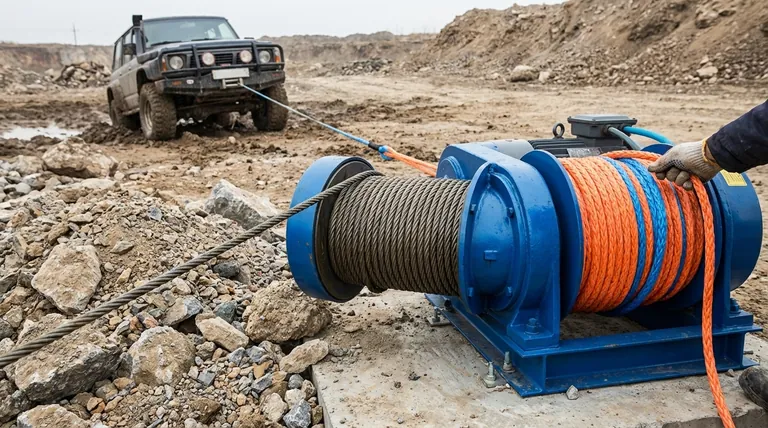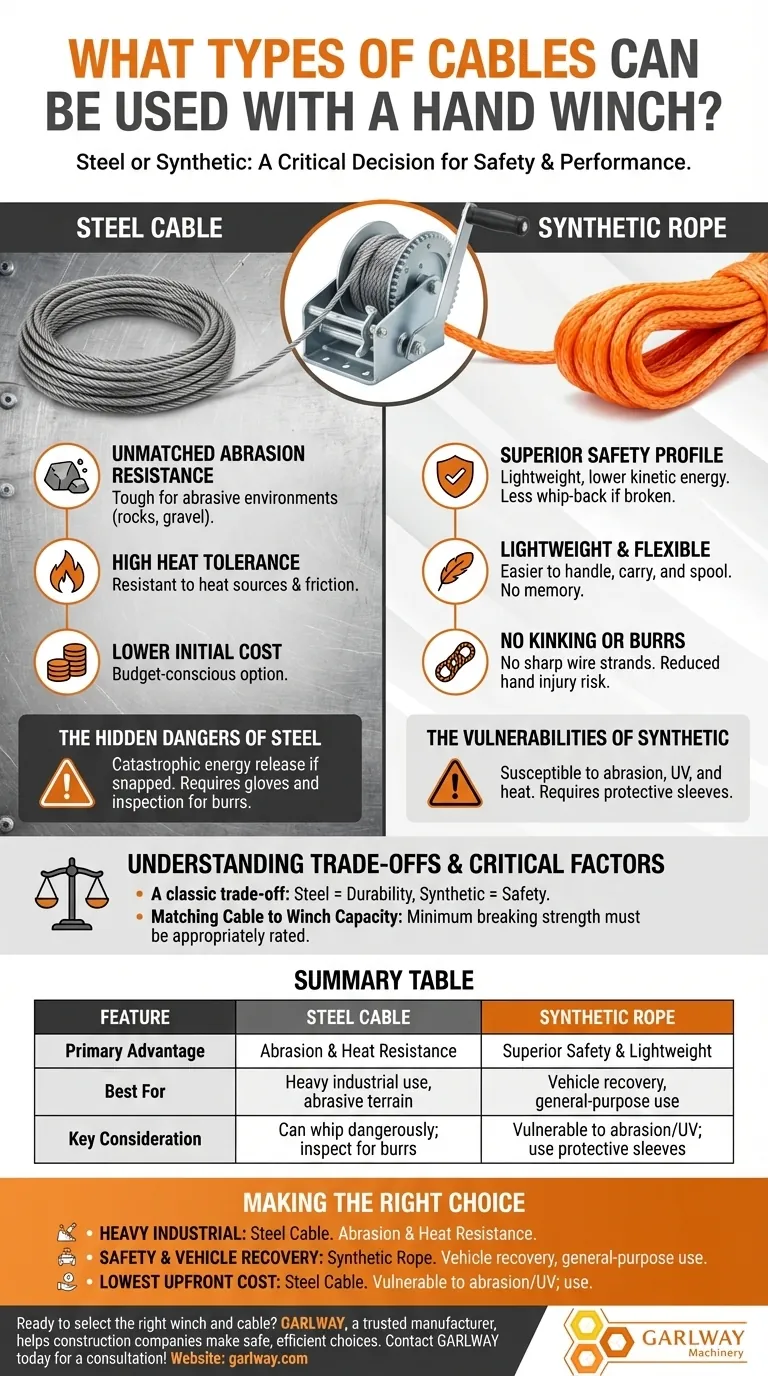In short, a hand winch can be fitted with either a steel cable or a synthetic rope. Your choice between these two materials is far more than a simple preference; it is a critical decision that directly impacts the safety, usability, and longevity of your equipment. The correct option depends entirely on the specific demands of your task and your working environment.
The decision between steel cable and synthetic rope is a classic trade-off. Steel offers maximum durability against abrasion and heat, while synthetic provides a significant advantage in safety and ease of handling.

The Case for Steel Cable
Steel cable is the traditional choice for winching and remains relevant for specific, demanding applications where its unique properties are an advantage.
Unmatched Abrasion Resistance
Steel is exceptionally tough. It excels in environments where the line will be dragged over abrasive surfaces like rocks, gravel, or rough ground.
High Heat Tolerance
Its metallic construction makes steel cable highly resistant to heat. This is a key advantage if the winch is used near high-temperature sources or in situations involving significant friction.
Lower Initial Cost
Generally, steel cable is less expensive to purchase upfront than a comparable synthetic rope, making it a common choice for budget-conscious applications.
The Advantages of Synthetic Rope
Synthetic rope has become the modern standard for many applications, particularly in vehicle recovery and situations where user safety is the highest priority.
Superior Safety Profile
This is the most significant advantage. Synthetic rope is lightweight and stores far less kinetic energy under load. If it breaks, it is much less likely to whip back with lethal force compared to a snapped steel cable.
Lightweight and Flexible
Synthetic rope is dramatically lighter than steel cable, making it much easier to carry, handle, and spool onto the winch drum. It does not kink or develop a "memory" like steel.
No Kinking or Burrs
Steel cables can develop sharp, broken wire strands known as "fishhooks" or "burrs," which can easily cause serious hand injuries. Synthetic rope is a textile product and does not have this hazard.
Understanding the Trade-offs and Critical Factors
Neither option is perfect. Acknowledging their respective weaknesses is essential for safe and effective operation.
The Hidden Dangers of Steel
The primary drawback of steel is its failure mode. A snapped cable under tension can release a catastrophic amount of energy. It also requires diligent inspection for kinks and broken strands, and heavy leather gloves are non-negotiable for handling.
The Vulnerabilities of Synthetic
Synthetic rope is highly susceptible to damage from sharp edges and abrasion. It can also be weakened by prolonged exposure to UV light and can be damaged by excessive heat. Using protective sleeves over sharp corners is mandatory.
Matching Cable to Winch Capacity
Regardless of material, the cable's minimum breaking strength must be rated appropriately for the winch's maximum pulling capacity. Using an underrated cable is a direct path to catastrophic failure.
Making the Right Choice for Your Application
Your final decision should be based on a clear understanding of your most common use case.
- If your primary focus is heavy industrial use or dragging loads across abrasive terrain: Steel cable offers the best durability and heat resistance for these demanding jobs.
- If your primary focus is safety, vehicle recovery, or general-purpose use: Synthetic rope is the superior choice due to its lighter weight and significantly safer failure mode.
- If your primary focus is the lowest upfront cost: Steel cable is typically the more economical option, but you must commit to the necessary safety precautions.
Understanding these core differences empowers you to select the right tool, ensuring both safety and efficiency for your task.
Summary Table:
| Feature | Steel Cable | Synthetic Rope |
|---|---|---|
| Primary Advantage | Abrasion & Heat Resistance | Superior Safety & Lightweight |
| Best For | Heavy industrial use, abrasive terrain | Vehicle recovery, general-purpose use |
| Key Consideration | Can whip dangerously if broken; inspect for burrs | Vulnerable to abrasion/UV; use protective sleeves |
Ready to select the right winch and cable for your project? As GARLWAY, a trusted manufacturer of construction machinery including winches, concrete mixers, and batching plants, we help construction companies and contractors globally make safe, efficient choices. Our experts can guide you to the optimal solution for your specific needs. Contact GARLWAY today for a consultation and enhance your worksite safety and performance!
Visual Guide

Related Products
- Portable Small Trailer Winch
- JZC400 Mobile Small Concrete Mixer Cement Mixer Machine
- Portable Electric Small Cement Mixer Concrete Machine
- HZS35 Small Cement Concrete Mixing Batch Plant
- Ready Mixer Machine for Construction Ready Mix Machinery
People Also Ask
- What types of applications are portable winches suitable for? A Mobile Power Solution for Any Location
- Are portable winches worth it? Unlock Unmatched Versatility for Your Projects
- How does mounting flexibility benefit portable winches? Achieve Superior Versatility for Any Job
- What safety tips should be followed when using a portable winch? Master the 3-Phase Safety Protocol
- What storage consideration is mentioned for portable winch setups? A Complete System for True Mobility


















